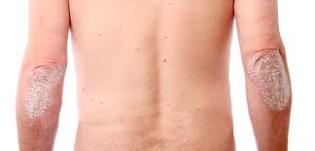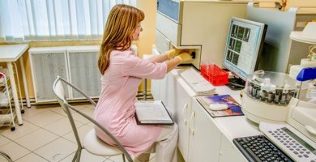Psoriasis - a non-communicable skin condition that is manifested by the emergence of red peeling spots, which itch the silvery scales. As usual, the psoriasis develops in young people from 20 to 30 years. The disease carries a risk of a person's life, but it causes serious suffering of a psychological nature, and it's up to social isolation.

The causes of the disease
Reasons that cause psoriasis, to date, up to the end is not revealed. There are some factors that are bound up with the appearance of psoriasis. But by themselves these factors are able to induce psoriasis, only in combination with each other, which can serve as a stimulus to the development of this pathology:
- genetic predisposition;
- reduction of the protective properties of the organism;
- emotional disorders;
- pathology of the endocrine system.
It is believed that psoriasis can be due to imbalances in the functioning of the immune system. In thicker skin accumulates a large amount of T-lymphocytes, which leads to chronic inflammation of the affected places. Histological studies of psoriatic material confirms the presence of high concentration of immune cells in the affected areas, which allows you to confirm the immunological factor in the development of psoriasis.
Genetic predisposition to psoriasis confirmed the presence of mutations in several DNA locations. These areas are responsible for the development of immune cells T-lymphocytes. Breakage of these lands can trigger the development of psoriasis. So, if the parents suffer from psoriasis, then your risk of developing this disease in a child is 50%, and even higher. Scientists also link the development of psoriasis is already in adult humans with mutations of certain genes.
Also cause the development of psoriasis can be stress, which leads to the deterioration of the symptoms of the disease. Emotional disturbance is able to initiate the release of hormones into the blood, which leads to a number of biochemical reactions, which, in turn, contribute to the emergence of various rashes on the skin.
Study of the etiology of psoriasis found that in many sufferers are disorders from the endocrine and the genitourinary system, in addition, there was a violation of the process of the formation of pigmentation.
It is also possible to mention the auxiliary factors leading to the development of psoriasis: ecology, injury, unbalanced diet, bad living conditions, the disruption of the foundations of hygiene.
You can say that psoriasis is hereditary to certain diseases: in its development activated the whole complex of the above reasons.
The symptoms of the disease and its types
Psoriasis has some common specific symptoms that allow you to accurately diagnose this disease. With psoriasis develop three characteristic states:
- "bath" spots, which when you try to curettage of the nail, exfoliate, and on its consistency similar to wax and stearin;
- red glossy surface, which is formed after the separation of scales and plaques. Its usually called a terminal foil;
- very characteristic of psoriasis — a symptom of "blood dew". If scraping all the flakes and plaques, then on the surface of the skin to bring small bloody dots like drops of dew.
Most often a psoriatic rash localized in the area of bending of the large joints, in the area of the armpits, on the scalp, in the groin, under the milk glands on the nails. The disease begins with the appearance of the population itching symmetrical rash, then merge into one big conglomerate, which occupy large areas of the skin. Itching becomes not tolerant, and study the scales causes the formation of "bloody dew".

The diagnosis of psoriasis causes some difficulties, because there are many types of this disease. Psoriasis has the following shape:
- vulgar (common psoriasis);
- psoriasis of the board;
- pustular psoriasis;
- psoriasis flexion surfaces;
- spot psoriasis or in the form of drops.
Each type of psoriasis has its own code in the international qualification of diseases (ICD-10). Each type of disease has its own symptoms, signs and causes of occurrence.
Treatment of psoriasis
Treatment of psoriasis is more difficulty, because the disease has a chronic period of time of remission. However, in today's time can significantly improve the patient's condition due to the reduction of the clinical manifestations. Treatment of psoriasis is performed by a complex use of the total medical therapy, local therapy, the application of physiotherapy methods and immunomodulators.
In the first place to use a topical medication for external use. In the composition of these drugs include substances that contain:
- Glucocorticosteroid hormones, which are able to prevent the active multiplication of the cells of the skin, but also reduce inflammatory phenomena, itching of the skin and the attenuation of the immune system.
- Preparations with a basis of vitamin D, the effectiveness of which is manifested in conjunction with uv radiation.
- Products with active zinc, which quickly eliminate the itching of the skin and congestion of the skin sheets.
Systemic (overall) treatment of psoriasis is used:
- Corticosteroids, which eliminate the symptoms of inflammation and regulate metabolism.
- Cytostatics prevents the uncontrolled division of the cells.
- Immunomodulators eliminate the dysfunction in the immune system.
- Non-steroidal drugs which eliminate only the symptoms of the disease: the foci of inflammation and itching, without affecting the causes of the disease.
Physiotherapy treatment keeps to himself a number of procedures:
- PUVA-therapy. This method consists in the use of photoactive chemical agents which are used together with long-wave uv radiation.
- Hirudotherapy. The use of leeches to treat psoriasis, which improve the outflow of blood.
- Cryotherapy. The method consists in immersing the patient for a few minutes into the camera with a very low air temperature. This method helps to effectively eliminate the manifestations of foci of inflammation and greatly reduce itching.
Treatment of psoriasis folk methods sometimes gives good results. Before you start to treat necessarily requires the consultation of the doctor-dermatologist. The doctor should be aware of the methods of treatment and fully endorse.
Complications and prevention of psoriasis
Complications of psoriasis manifests itself in serious illnesses, which are very difficult to treat: psoriatic arthritis, pustular psoriasis and psoriatic erythroderma. Prevention of the disease involves the tonic measures:

- spa spa therapy;
- a balanced diet;
- healthy sleep;
- scans of chronic foci of infection;
- compliance with the rules of hygiene;
- moderate exercise the sport.























